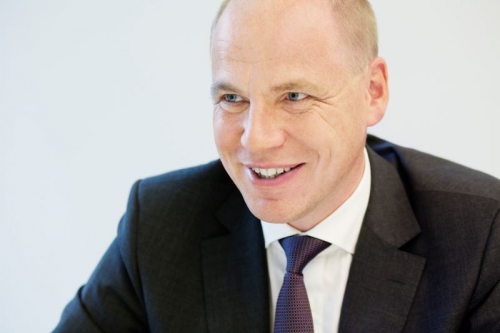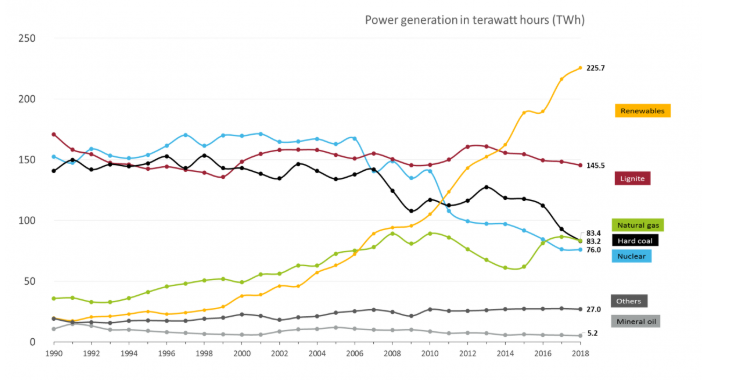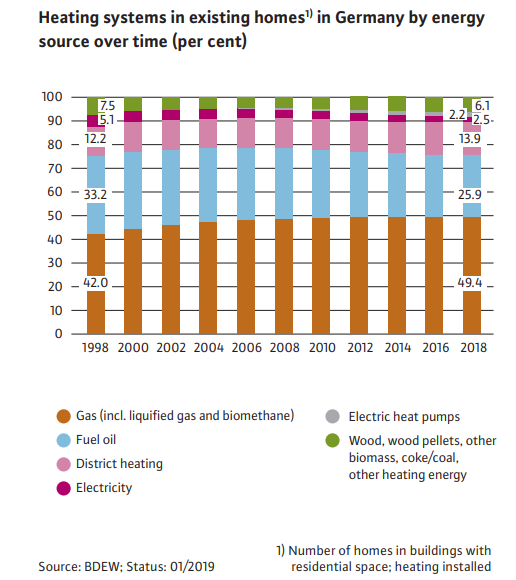Germany's Gas Faces a Bright Future: Kehler [Gas Transitions]
German gas demand is likely to grow much faster than predicted by the International Energy Agency (IEA). That’s the remarkably positive viewpoint of Timm Kehler, chairman of Zukunft Erdgas, a 130-member association that represents the entire gas value chain in Germany. According to Kehler, a combination of coal phase-out, coal-to-gas switching in power generation and oil-to-gas switching in heating heralds a bright future for gas in Germany. He says most of the German population understands that a “blunt distinction between fossil fuels and renewables does not work.”
 A major shift is taking place in the German energy policy debate with positive ramifications for gas, says Timm Kehler, chairman of Zukunft Erdgas (“Future Natural Gas”). Since its foundation six years ago, it has promoted natural gas in Germany and done a lot to make this shift happen. In an interview with NGW, Kehler notes that in October, the German government will present the results of a dialogue programme with the gas industry which – for the first time – is dedicated specifically to the role of gas in the country’s famous energiewende (energy transition). Kehler says the government is likely on that occasion to outline the contours of a strategy that will see gas become “an integral part of the energy transition.”
A major shift is taking place in the German energy policy debate with positive ramifications for gas, says Timm Kehler, chairman of Zukunft Erdgas (“Future Natural Gas”). Since its foundation six years ago, it has promoted natural gas in Germany and done a lot to make this shift happen. In an interview with NGW, Kehler notes that in October, the German government will present the results of a dialogue programme with the gas industry which – for the first time – is dedicated specifically to the role of gas in the country’s famous energiewende (energy transition). Kehler says the government is likely on that occasion to outline the contours of a strategy that will see gas become “an integral part of the energy transition.”
This is a new development, says Kehler. “Until recently, policy-makers believed that electrification alone, based on domestically produced solar and wind power, would be enough to meet the country’s climate goals. That perception has changed, both among policymakers and among the public. Gas is no longer seen as part of the problem. It is increasingly regarded as part of the solution.”
I discussed with Kehler the fascinating developments around natural gas in Germany. (See also my previous article, Germany (re)turns to gas.)
You say there has been a shift in the perception of gas in the German energy debate. Can you explain?
“Until two years ago, the idea among policy-makers and the public was that we could achieve our climate targets with electrification alone, based on domestically produced solar and wind power. Now the realisation has sunk in that this is not feasible.”
What happened?
“A number of studies appeared, including some of ours, that turned things around. Very important was the Integrated Energy Transition study by DENA, the state-owned Germany Energy Agency, which appeared last year. This showed that to reach the 2050 climate goals a mixed-technology scenario including various types of gas is far cheaper than an all-electric scenario. That study was a tipping point.”
How have you noticed the change in perception?
“For the last half year, we have had a very positive and constructive debate with policy-makers. The ministry of economic affairs and energy started a process called Gas Dialogue 2030 to discuss the ideas of the gas industry and to create a strategy for the future development of gas in Germany. What we see coming out of this dialogue is a strong proposition to develop gas in Germany. The overarching proposition will be that gas is an integral part of the energiewende. So things have clearly changed, from a fairly negative situation to a very constructive one.”
Does the general public share this constructive attitude towards gas?
“Yes, gas has a positive image among the public. We regularly do market research and we find that gas is always perceived as the number one choice in heating. We have 20mn customers. Every second home in Germany is heated with gas. A lot of houses are also still heated with oil. Gas comes out favourably compared to oil.”
But natural gas is still a fossil fuel. Doesn’t that bother people?
“The perception of the public is that the energiewende is not really a success story. We have the highest electricity prices in Europe, 30 cts/kWh for households, mainly owing to the levies for renewable energy. We spend roughly €26bn/yr in stimulating renewable energy, which also includes redispatching costs to balance the integration of renewables into the grid. On top we have grid fees on a similar level. And this figure is still rising as we are building more wind power in the north but are not able to move it to the demand centres in the south. Even so, the CO2 targets are not being met. A major part of the population understands by now that a blunt distinction between renewable energy and fossil energy does not work. They see that only a pragmatic combination is going to lead us forward.”
Zukunft Erdgas aims to secure a future for natural gas in Germany
Zukunft Erdgas was founded in 2013 by 26 companies from the German gas industry. Today it has over 130 members from all parts of the value chain, including small and large network operators, traders and suppliers such as Equinor and Gazprom. The aim of the association, says chairman Timm Kehler, is to represent the gas industry in the German energy policy debate and to position gas in competition with other forms of energy. According to Kehler, the German gas industry is very heterogenous, subsuming 700 companies, including many small players who have bundled their promotional and strategic activities in Zukunft Erdgas.
What will that pragmatic combination look like when it comes to gas?
“We still have more than 5mn boilers running on heating oil. And a large part of our electricity is produced with coal and lignite. Fuel-switching to natural gas will greatly reduce CO2 emissions. At the same time, it is well understood that the gas grid is capable of distributing from 10% up to 100% hydrogen, depending on the type of pipeline in place. The industry is conducting extensive research to increase the permitted hydrogen feed-in. Other green gases, however, such as biomethane or synthetic natural gas, can already today be fed into the existing infrastructure without limitations. We have a well-established gas infrastructure that can be used to transport energy much more efficiently than the power grid.”
How will this affect gas demand in Germany? The IEA’s Gas Outlook 2019, published in June 2019, says that German and European natural gas consumption is expected to remain stable for the next five years. The IEA’s World Energy Outlook 2018, published in November 2018, shows stable demand out to 2030 and weakening towards 2040. Are you more optimistic?
“Yes, for Germany I believe gas demand will grow. In the buildings sector, there is a move to replace oil by gas. In power generation, around half of our power comes from renewables, but a lot also comes from lignite. (See graph below). The government has decided to phase out coal power production gradually in the coming years. In addition, we are phasing out nuclear energy by 2022. We expect that this will lead to higher gas consumption. The determining factor for the growth rate of gas will be the speed at which renewable energy is expanded. The more renewable energy, the less gas. But we are seeing a drastic slowdown in the buildout of wind farms due to public resistance.”

Source: Clean Energy Wire/Data: EG Energibalanzen 2019
Do you expect to see new gas power generation capacity being built?
“Right now, we have about 30 GW of gas power generation, but the utilisation rates are between 10% and 20%. There is a lot of capacity available to compensate for the phaseout of coal and nuclear. Our existing gas fleet can maintain security of supply. As coal is phased out further, I think we will also see new gas power plants get built. There may be a few large ones, but personally I expect that they mostly will be smaller, highly efficient combined heat and power plants.”
Couldn’t the oil-fired boilers in the buildings sector be replaced by electric heat pumps?
“It has been one of our major achievements as Zukunft Erdgas to educate policymakers on the potential of heat pumps. They are very efficient for new buildings, but not in existing buildings that are not so well insulated. According to various studies, to remodel all existing buildings in Germany to make them suitable for electric heat pumps would cost an additional €2 trillion. We have 20mn existing homes and build 100,000 new homes annually. That shows the penetration rate heat pumps may have.”
Where will the gas come from? Do you support the building of Nord Stream 2?
“The German gas industry is very clear on Nord Stream 2. We believe every additional import route, whatever it is, will add to security of supply and to competition, which is good for our customers. So we don’t see any negative aspects about it, quite the opposite. Additional imports of LNG are also welcome and supported by the federal ministry for energy and economics. We are very optimistic that we will see one or two LNG terminals being built in Germany soon. Especially the proposed terminal in Wilhelmshaven seems a good proposition.”
In other countries there are worries about German dependence on Russian gas. Isn’t that an issue for you?
“We have been importing Russian gas for many decades. Supply has always been reliable, even when the [Berlin] Wall was still there. Therefore, for us it is not a problem that we also receive gas from Russia. Most of our customers feel the same way.”
What about the role of “green” gases, such as “green hydrogen”, i.e. based on electrolysis of renewable energy?
“The gas industry has understood that reaching the climate goals is mandatory. There is no alternative. That will have a major impact on what the gas industry will look like. We don’t want to fight this. We want to be drivers of this change. That’s why we are driving the development of green gas. We strongly promote the production of hydrogen from electrolysis. There are a couple of dozen of such “power-to-gas” projects being undertaken in Germany. They started with 1-MW projects, we now see them being scaled up to 100 MW. We also see the cost go down. This technology is on its way to becoming a reality in Germany.”
What about so-called 'blue' hydrogen, based on natural gas but without CO2 emissions?
“There is the possibility of producing hydrogen from natural gas and combining it with carbon capture and storage (CCS), which is what the Norwegians are promoting. We believe there will be a need for this. We had a study done by consultancy Pöyry, which came out in July 2019 [Hydrogen from natural gas – the key to deep decarbonisation], showing that the amount of “green" hydrogen that we will be able to produce will not be sufficient. So we believe there will be a role for “blue" hydrogen. Another promising technology is hydrogen produced from methane pyrolysis. With this method, you end up with carbon in solid form, so-called carbon black or graphitic carbon. This can be used in various industrial processes. The Karlsruhe Institute of Technology is doing a lot of research on that. What we hear from them and other labs about pyrolysis is extremely promising.”
Isn’t CCS controversial in Germany?
“Yes, it is, but here too I believe the mood is changing. Increasingly people are beginning to understand that CCS will have to be part of the solution. Even a WWF representative admitted this recently in an op-ed for the German energy trade title, Energate.”
Do you see Germany importing hydrogen in the future?
“Yes, that’s a possibility. Again, there has been a major shift in perception when it comes to energy imports. Until recently the sentiment was that we had to do everything domestically with wind and solar. People now understand that this is not realistic. We import 80% of our energy. In the future, we will of course import green energy rather than oil, gas and coal.”
Do you see possibilities for the use of gas in transport?
“There are interesting developments taking place in heavy-duty vehicles. Since the introduction of the subsidy programme roughly a year ago, the ministry of economic affairs gave subsidies for 1,390 clean energy trucks. Of those, 1,330 run on gas and only 60 were electric. So we will see more than a thousand new trucks on the road running on gas. The toll exemption for clean trucks is a strong incentive for this. The environment ministry is still experimenting with overhead lines on the autobahn. There are two test tracks in Germany, with a truck running along them. I think this is a delusion.”
What about the prospects of biomethane?
“That’s a large story in itself. It has been neglected for a while, but it has a lot of growth potential. We see industry and policymakers are renewing their interest in biomethane.”
How will the new German stance on gas affect EU gas policy?
“The EU is expected to draw up a new Gas Package in 2020 which will be key to how European gas markets will evolve over the next decade. Germany will have the EU presidency in the second half of 2020. We believe the German government will use its position to come up with a positive perspective for gas. The most important thing that needs to be done, in our view, is to set a target for green gas. That would stimulate investment. I think the German government is moving in that direction.”
Switching from oil to gas in home heating systems could save millions of tons of emissions
Almost half of the 5.8 million buildings with heating oil systems could quickly be connected to nearby gas grids or district heating, which would save 14 million tonnes of CO₂ emissions. That’s the conclusion of a new study by the German Association of Energy and Water Industries (BDEW), reports The Clean Energy Wire (CLEW). Swapping the oil systems for other modern heaters, such as electric heat pumps, could save up to 30 million tonnes CO₂, BDEW added.
In Germany conservative party head Annegret Kramp-Karrenbauer has made a proposal for a scrappage premium for old oil heating systems. Such a measure could give a push to the "urgently needed heating transition" in Germany, BDEW said in a press release.
Half of the roughly 42mn homes in Germany are heated with natural gas, a quarter with oil, 14% through district heating and the rest with electricity, electric heat pumps and biomass, according to data for 2018 by BDEW (see graph below).




